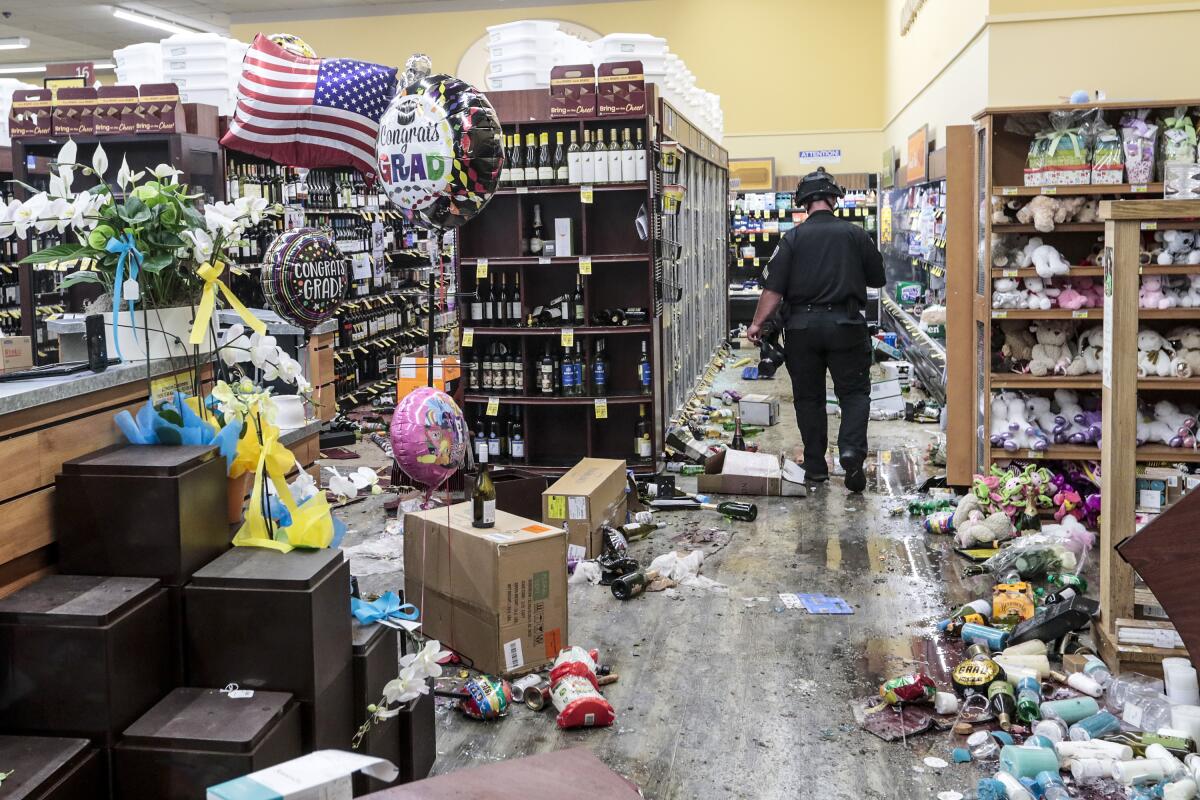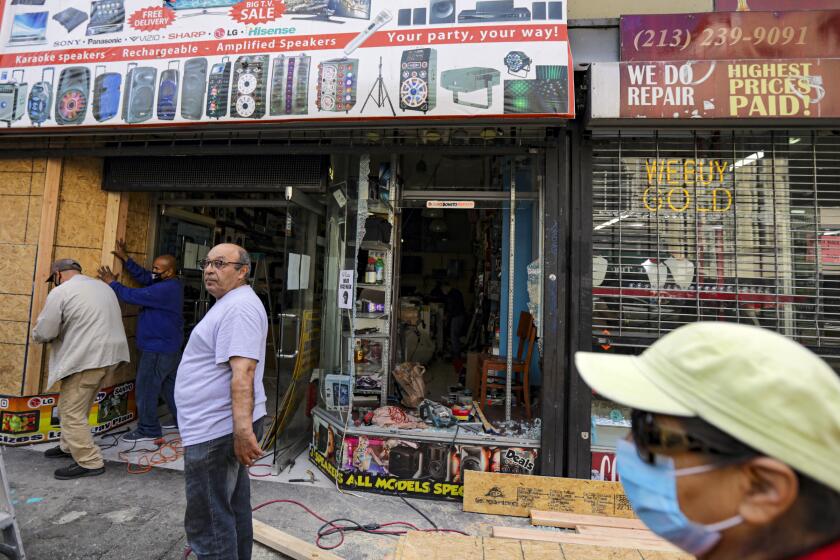Column: Stores may be insured for looting. But guess who pays in the end (hint: you)

- Share via
Randle Frankel, who runs a commercial-property insurance brokerage with clients throughout Los Angeles County, could only shake his head when some people looting stores over the weekend said this won’t hurt anyone because the businesses are insured.
Yes, most retailers are covered for such criminal activity, Frankel told me, but not necessarily for total damage or losses. As with all insurance, it depends on how much coverage they’ve purchased.
Moreover, the buck doesn’t stop with the insurance company.
“If carriers are paying out claims for hundreds of millions in losses, they’re going to try and recoup,” Frankel said. “There will be repercussions. Rates will go up.”
Higher insurance rates inevitably will be passed along to customers in the form of higher retail prices, which means, going forward, higher out-of-pocket costs for sneakers, clothing and other goodies obtained without a five-finger discount.
Which is to say, looting is not a victimless crime, as some have tried to argue in defending such behavior.
It has very real consequences for business owners and, in turn, their customers. In the long run, we all pay.
“In my experience, after every event like this, there will be price increases,” Frankel said. “Rates have to go up.”
In case it needs underlining, the theft and vandalism have nothing to do with the largely peaceful protests over the death of George Floyd. This is criminal behavior, full stop.
My colleagues Sam Dean, Laurence Darmiento and Ronald D. White did a good job outlining how not all landlords require commercial tenants to insure their inventory.
National chains’ losses are covered by large insurance policies. But the financial impact on small businesses varies widely.
As a general rule of thumb, they reported, a small-business owner with up to 100 employees may spend $1,200 a year for coverage. Larger companies, I’m told, pay significantly more than that.
But these are extraordinary times. Because of the COVID-19 pandemic, many businesses have let their insurance policies lapse or have reduced coverage because they’ve had no money coming in the door for months.
“A lot of my clients have cut back,” said Gino Mattunts, a Glendale-based commercial insurance broker. “There have been a lot of cancellations.”
He also said theft insurance often comes with a large deductible to make coverage more affordable. The owner of a sneaker store that was gutted by looters, in other words, may be on the hook for a significant portion of the losses.
Mattunts said it’s possible insurers will issue new requirements to businesses in light of this surge in theft and property damage.
“Think what it’s like walking at night in downtown L.A.,” he said. “Everywhere you look, you see heavy steel gates. That’s because of past experiences in that area. We could see that in the future throughout the city.”
Karl Susman, a commercial insurance broker in Brentwood, agreed that heightened security measures are possible.
First, though, he expects insurers to try to reduce their risk by jacking up businesses’ deductibles, making the business owners absorb more financial risk.
They’ll also stop issuing new policies until they can factor in these latest developments, Susman said.
I asked if local businesses haven’t had looting risk reflected in their policies since the Rodney King riots in 1992, which caused about $1 billion in property damage. Didn’t that already change the insurance landscape?
“No,” Susman replied. “That barely made a blip in terms of rates and deductibles because it was so localized.”
What we’re seeing now is different, he said. The recent property damage in some of the region’s most affluent commercial districts goes well beyond, in terms of geography, what business owners experienced in 1992. Similar dynamics are playing out in commercial centers nationwide.
“This is more like a brush fire,” Susman explained. “It’s very widespread, and the industry will respond with new measures.”
For consumers, the brush fire metaphor is a good one. The catastrophic fires of recent years may not have resulted in everyone’s house burning down, but it changed how home insurance was offered in California.
Some insurers exited the market, concluding that the state’s fire danger would only get worse. Those that remained raised rates and deductibles for nearly all homeowners to reflect the climate-change reality that we’re living in a tinderbox.
“With home insurance, the rates keep going up because we have losses after losses after losses,” Susman said.
“We could now see the same for commercial insurance, and businesses will pass along their higher costs to customers.”
Mitch Davis, a commercial insurance consultant based in Austin, Texas, told me there’s no question coverage providers now will start weighing theft and vandalism more heavily in setting rates.
“Insurers already are putting in exclusions for communicable diseases as a result of the coronavirus,” he said. “We never really saw that before. The same will happen because of the looting.”
His advice to cash-strapped businesses is to forgo submitting a claim for relatively minor damage, such as a broken window.
“By absorbing that loss, you may be able to avoid a rate increase in the short run,” Davis said. “Longer term, rates and deductibles will rise.”
Tony Cignarale, California’s deputy insurance commissioner of consumer services, said the likelihood of higher rates for businesses — and thus higher prices for consumers — is very real.
“We are monitoring it minute by minute and trying to figure out where rates will go in the future,” he said.
Spoiler alert: Up.
Enjoy the new kicks, looters. We’re all paying for them.
More to Read
Inside the business of entertainment
The Wide Shot brings you news, analysis and insights on everything from streaming wars to production — and what it all means for the future.
You may occasionally receive promotional content from the Los Angeles Times.












